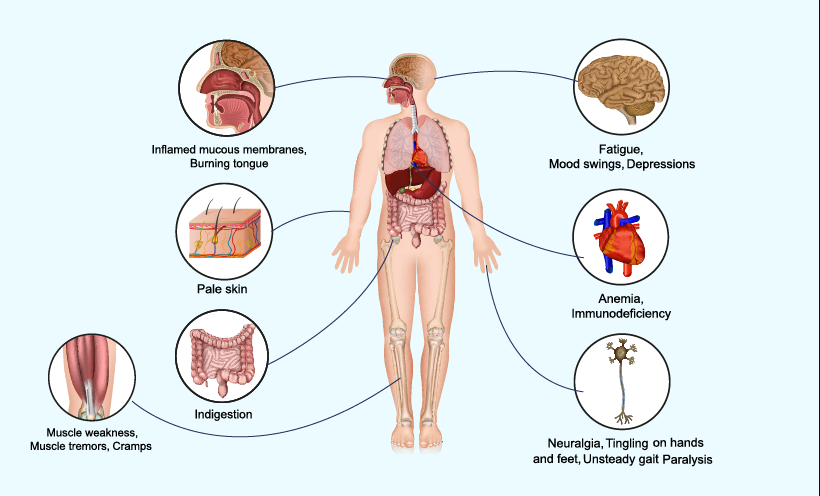Discover why Vitamin B12 is crucial for preventing paralysis and maintaining overall health.
In the realm of health and wellness, the significance of vitamins cannot be overstated. Among these essential nutrients, Vitamin B12 stands out as a cornerstone of bodily function, playing a pivotal role in neurological health. Yet, its connection to paralysis is often overlooked or misunderstood. In this comprehensive guide, we delve deep into the relationship between Vitamin B12 deficiency and paralysis, shedding light on why ensuring optimal levels of this vital nutrient is paramount for maintaining mobility and overall well-being.
Understanding Vitamin B12: The Neurological Powerhouse
Vitamin B12, also known as cobalamin, is a water-soluble vitamin that plays a crucial role in various bodily functions, particularly in the nervous system. It is essential for the formation of myelin, a protective sheath that surrounds nerves and facilitates the transmission of nerve impulses. Additionally, Vitamin B12 is involved in the synthesis of neurotransmitters, the chemical messengers that relay signals between nerve cells. Without an adequate supply of Vitamin B12, these essential processes are disrupted, leading to a cascade of neurological symptoms, including paralysis.
ALSO READ: Unlocking The Healing Power Of Navara Kizhi Therapy

The Link Between Vitamin B12 Deficiency and Paralysis
Paralysis, the loss of muscle function in part of your body, can result from a variety of causes, including trauma, stroke, and neurological disorders. However, Vitamin B12 deficiency is a lesser-known yet significant contributor to this debilitating condition. When the body lacks a sufficient amount of Vitamin B12, the nerve cells become damaged, impairing their ability to transmit signals effectively. Over time, this can manifest as weakness, numbness, and eventually paralysis, particularly in the extremities.

Case Studies: Illuminating the Connection
Numerous studies have highlighted the correlation between Vitamin B12 deficiency and paralysis. In one compelling case study, published in the Journal of Neurology, Neurosurgery & Psychiatry, researchers examined a group of patients presenting with unexplained neurological symptoms, including paralysis. Upon further investigation, they discovered that the majority of these individuals were deficient in Vitamin B12. Through supplementation and dietary changes, many of the patients experienced significant improvements in their symptoms, underscoring the importance of addressing Vitamin B12 deficiency in paralysis management.

Recognizing the Symptoms
Identifying Vitamin B12 deficiency can be challenging, as its symptoms often mimic those of other conditions. However, being vigilant about recognizing the signs can facilitate early intervention and prevent further complications, including paralysis. Common symptoms of Vitamin B12 deficiency include:
- Fatigue and weakness
- Numbness or tingling in the hands and feet
- Difficulty walking or maintaining balance
- Cognitive impairment, such as memory loss or confusion
- Mood changes, including depression or irritability
- Paleness or jaundice
If you or someone you know is experiencing any of these symptoms, it is crucial to consult a healthcare professional for proper evaluation and diagnosis.
ALSO READ: Unlocking The Ancient Healing Art Of Pizhichil: A Therapeutic Marvel

Preventing Vitamin B12 Deficiency: Strategies for Optimal Health
Fortunately, Vitamin B12 deficiency is highly preventable through simple lifestyle modifications and dietary choices. Incorporating Vitamin B12-rich foods into your diet, such as meat, fish, dairy products, and fortified cereals, can help ensure an adequate intake of this vital nutrient. Additionally, supplements are available for those who may have difficulty absorbing Vitamin B12 from food sources, such as older adults or individuals with certain medical conditions.

The Importance of Regular Screening
Regular blood tests can also help monitor Vitamin B12 levels and detect deficiencies early on, allowing for timely intervention and prevention of complications. Healthcare providers may recommend screening for Vitamin B12 deficiency as part of routine check-ups, especially for individuals at higher risk, such as vegetarians, older adults, and those with gastrointestinal disorders.

Empowering Health Through Vitamin B12 Awareness
In conclusion, Vitamin B12 plays a critical role in neurological health, and its deficiency can contribute to paralysis and other debilitating symptoms. By understanding the importance of Vitamin B12 and taking proactive steps to maintain optimal levels, individuals can safeguard their neurological function and overall well-being. Through education, awareness, and early intervention, we can empower individuals to take control of their health and prevent the devastating effects of Vitamin B12 deficiency.
ALSO READ: 5 Best Fat-Burning Cardio Exercises For Women Over 40
Click here, to check out HNN’s latest post.
Image source: Google




































